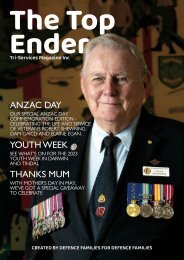The Top Ender Magazine October November 2020 Edition
Oct Nov 2020 Magazine
Oct Nov 2020 Magazine
You also want an ePaper? Increase the reach of your titles
YUMPU automatically turns print PDFs into web optimized ePapers that Google loves.
Feature – Support
In Support of the ADF
Mental Health & Wellbeing
Larrakeyah Defence Precinct and HMAS Coonawarra have
led the way during COVID-19 in ensuring that all ADF
personnel are ‘fit to fight’ at all times. Maintaining and
looking after their mental and physical health is a high
priority and is also important to continue to look after your
family’s mental wellbeing as well. The Defence community
is able to respond to different situations through our
strengths by adapting to change, working together, and
looking out for each other.
Command, supervisors and managers must remain flexible in their approach
to personnel leave and to encouraging people to work flexibly, for example
shift work or split shifts wherever possible. Personnel can work from home
via DREAMS, if it works for both the organisation and the individual while still
meeting ADF workplace targets and goals.
Tips and Tools for Leaders
As a leader, you are critical to workplace mental health and wellbeing because you
know your people and can recognise changes in behaviour. Improving your communication
and promoting self-care practices will help your teams to feel connected and
supported. This improves work relationships, productivity and willingness to seek help.
Improving Communication:
People need frequent and authentic communication in times of change, stress
and uncertainty. Good communication helps people to remain productive and find
meaning in their work. Whether your team is large or small, in an office or homebased,
there are things you can do to improve communication.
Frequency
» Increased contact provides reassurance. If meetings are weekly, consider two per
week – one about tasks and the other on wellbeing.
» Include self-care and wellbeing at the beginning of discussions, not as an afterthought.
» Encourage people to seek conversations with you. Let them know you have created
‘space’ for them and that it is no bother.
Authenticity
» Have open and genuine conversations about wellbeing to destigmatise mental
health concerns and reduce barriers
to seeking care.
» Foster a culture where people can ask
for help before stress becomes a serious
concern.
» Encourage sharing of self-care strategies
and value how people are
adapting to circumstances.
Planning
» Anticipate concerns and manage
expectations to build trust. Be flexible
about agendas. Create a standing item
for wellbeing.
» Start meetings by checking how
people are. Encourage sharing (as far
as people are comfortable) about selfcare
strategies.
» Be timely, clear and concise in written
communications so you don’t overwhelm
people. Consider periodic
is also important
to continue to look
after your family’s
mental wellbeing as
well
34 The Top Ender | Tri-Services Magazine Incorporated


















